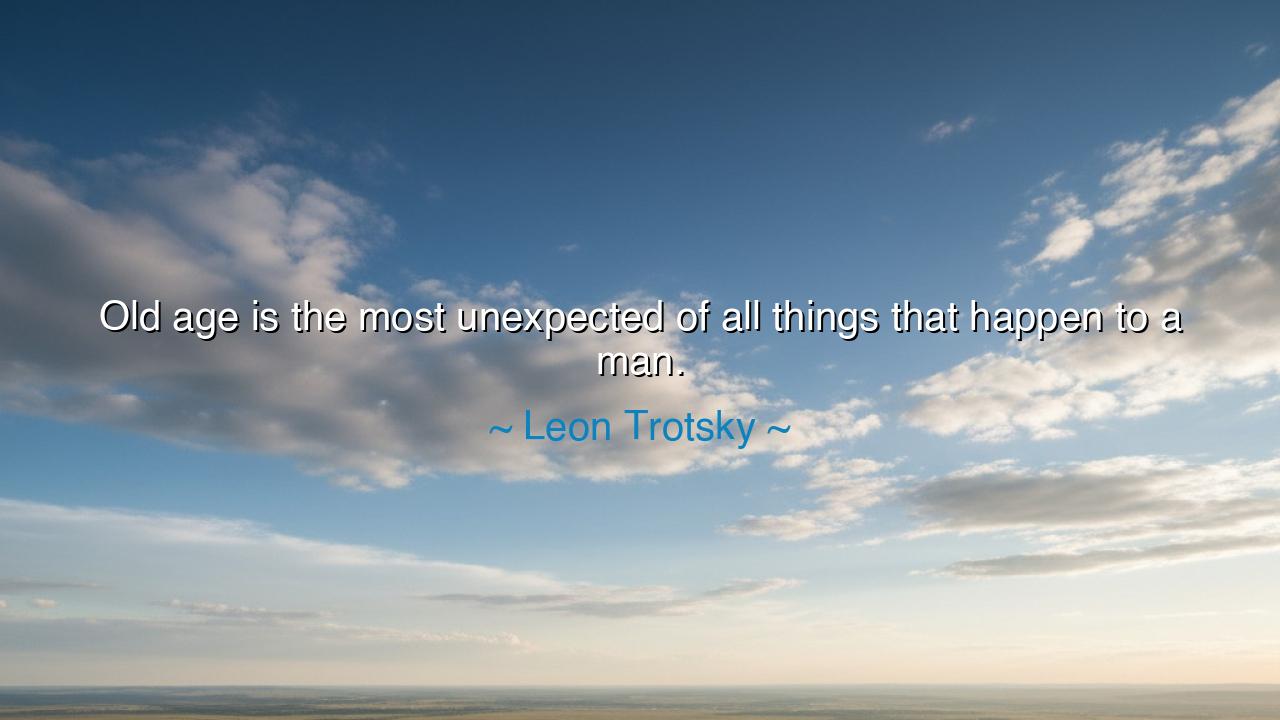
Old age is the most unexpected of all things that happen to a






"Old age is the most unexpected of all things that happen to a man." These words by Leon Trotsky reflect a deep truth about the human experience—one that many find surprising and unsettling. Trotsky, a revolutionary leader whose life was marked by both intense ambition and struggle, recognized that, no matter how hard we strive, no matter how much we plan, old age is a force that sneaks up on us, uninvited and often unwanted. It is not a stage of life that we anticipate when we are young, for we are too absorbed in the passions and aspirations of youth, looking forward to achievement, conquest, and the promise of an endless horizon. The idea of aging often seems distant, and it is only when we find ourselves facing it that we realize how unexpected it truly is.
In the wisdom of the ancients, old age was often viewed with a mix of respect and fear. Homer, in the Iliad, described the old warriors who, despite their advanced years, still carried with them a wealth of knowledge and experience. Yet even these great heroes were not exempt from the inevitable decline of the body. Achilles, in his youth, was driven by rage and the desire for glory, but as he grew older, the weight of time began to wear on him. It was not just his physical form that deteriorated, but his soul, as he grappled with the knowledge of his own mortality. This tension between the vigor of youth and the acceptance of old age was a theme the ancients knew well, and Trotsky, too, felt this paradox deeply.
Take, for instance, the life of Julius Caesar, whose rise to power in his early years seemed limitless. As a young man, he was full of ambition, energy, and brilliant strategy. He conquered lands, led armies, and became one of the most influential figures in Roman history. Yet, despite his extraordinary accomplishments, old age eventually caught up with him. He found himself confronting the limitations of time, and even in his early fifties, he was struck down by his enemies in an act that marked the end of an era. The surprise of old age, as Trotsky points out, is that no one can truly anticipate when it will arrive or what it will demand of us. Even the greatest of men, those with the world at their feet, are humbled by its inevitability.
Trotsky himself, in his final years, faced the unexpected nature of old age. As a revolutionary leader and writer, his life had been filled with the fire of ambition and the desire to reshape the world. But as he grew older and found himself exiled, stripped of power, and betrayed, the passage of time revealed a different kind of struggle. His political battles had given way to the grief of isolation and the slow realization that no amount of revolutionary zeal could shield him from the physical and emotional toll of time. Trotsky’s tragic end in Mexico, assassinated by an agent of Stalin, served as a bitter reminder that no one—whether a world leader or a common man—can escape the inevitable march of old age.
Trotsky's quote resonates because it reminds us of how unexpected and uncontrollable life can be. We may plan, we may strive for greatness, and we may achieve much, but in the end, old age is a great equalizer, catching even the most driven individuals off guard. The physical decay that comes with age often forces us to confront what we once took for granted—our vigor, our strength, and our youthful ambition. As Trotsky himself experienced, old age is not something we can always foresee or prepare for, and it often brings with it a humbling recognition of our own limitations.
The lesson in Trotsky's words is a powerful one: we must live with awareness of the fragility of time. Though we may feel invincible in our youth, we must never forget that old age comes for all of us, often when we least expect it. The key, then, is not to fear the passage of time, but to embrace it, using the wisdom and experience we gain along the way to live with greater purpose and peace. Instead of resisting age, we must learn to reconcile with it, understanding that each stage of life has its own value and purpose.
In practical terms, the challenge is to live in the moment, to appreciate the present without becoming obsessed with the future or haunted by the past. Youth may be fleeting, but it is in the choices we make today that we build the foundation for a meaningful life, one that can transcend the limitations of both youth and old age. Whether we are young or old, we must strive to live with integrity, purpose, and awareness, knowing that the unexpected nature of old age is a reminder that all of life is fragile, and each moment is a gift that should be cherished.






AAdministratorAdministrator
Welcome, honored guests. Please leave a comment, we will respond soon